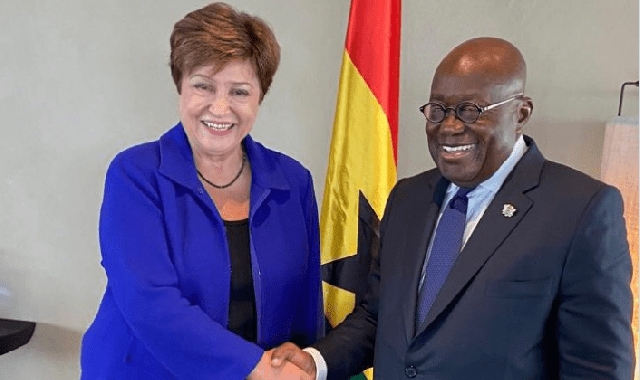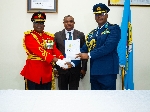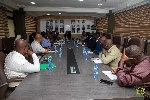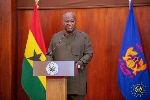Even IMF boss knows I was steering economy to growth before Covid, Ukraine war hit – Akufo-Addo
 IMF MD Kristalina Georgieva in a handshake with President Nana Akufo-Addo
IMF MD Kristalina Georgieva in a handshake with President Nana Akufo-Addo
President Nana Akufo-Addo has wondered why some people are refusing to accept that his government was steering the country to growth before the Covid-19 pandemic and the Russia-Ukraine war.
“I have said, and many others, including the Managing Director of the IMF, have said that our economy was doing well until COVID-19 and the war in Ukraine took us off course”, the president told parliament on Wednesday, 8 March 2023 in his state of the nation address.
“Maybe, because of the severity of the present difficulties, or maybe because it suits their preconceived agenda, some people are unwilling to accept that we were on a good trajectory until the arrival of COVID-19”, he observed, adding: “The Ghanaian people, however, accepted this proposition, as evidenced in the results of the 2020 presidential election, which were unanimously endorsed and upheld by the seven-member panel of the Supreme Court”.
Going back a few years to make his point, the president said: “This is what I told this House on 20th February 2020, and I quote: ‘Mr. Speaker, in three years we have reduced inflation to its lowest level (7.8% in January 2020) since 1992. For the first time in over forty (40) years, we have had a fiscal deficit below five percent (5%) of GDP for three years in a row. For the first time in over twenty (20) years, the balance of trade (that is the difference between our exports and imports) has been in surplus for three (3) consecutive years. Our current account deficit is shrinking, interest rates are declining, and the average annual rate of depreciation of the cedi is at its lowest for any first term government in the Fourth Republic. Our economic growth has rebounded to place Ghana among the fastest growing economies in the world for three years in a row at an annual average of 7%, up from 3.4% in 2016, the lowest in nearly three decades. The international investor community has recognised this development, resulting in Ghana, today, being the largest recipient of foreign direct investment in West Africa. The sovereign credit ratings agencies have upgraded our ratings, and also improved the outlook for this year, notwithstanding the fact that it is an election year’.
“Mr Speaker, that was where we were at the end of February 2020.
Three weeks after this speech, in which I expressed our sympathies and solidarity with China on the difficulties they were having with a new virus, our world changed. The virus, I referred to, arrived in our country and in the rest of the world with a vengeance”, he recalled.
He said: “Within weeks, we were in the middle of a lockdown, our airports and land borders were closed. Schools and factories and even markets were closed. The hospitality industry was brought to its knees. Our economy, like much of the rest of the world, went into a tailspin”.
“We took many decisions, we did many things which, according to the science, were the most reliable and trusted ways to save lives and livelihoods at the time, which may look strange and unnecessary today, but that is from the safe perspective of not waking up to check on the COVID-19 infection or death rate”.
“Indeed, there were some who suggested that we cancel the national identification registration exercise, and even postpone the 2020 general elections”, he said.
“Who would have thought that today, anybody will be questioning the fumigation of schools and markets? I recall, vividly, the straight-talking I received from a group of our most eminent physicians and other scientists on the urgency of fumigating all public spaces, including offices, schools, hospitals, markets, churches and mosques. The few who could afford it fumigated their homes”.
“Today, the science might be that such measures make no difference to the spread of the virus, but criminality or reckless spending cannot be ascribed to the decision to undertake such measures”.
“Mr Speaker, you might remember that we could not produce veronica buckets fast enough. Today, it is not an obligatory item on anyone’s list of purchases”.
“In dealing with the crisis generally, I did not meet anyone brave enough to suggest that considerations of money should be a hindrance to anything we needed to do in the fight against the virus”.
“I was and I am grateful that the people of Ghana rose to the occasion and, together, we went through the crisis and came out well by defying the doomsday predictions about the inevitability of dead bodies on our streets. I am grateful that we saw the wisdom in helping each other, and I thank those who contributed their expertise, time and energy to the fight against the virus, and I thank those who contributed to the COVID-19 fund that was set up to help us meet some of the expenditures. The economic consequences from the pandemic have been devastating”.
“Mr Speaker, it is precisely because the economic fallout from the pandemic is so widespread and long-lasting that it is important to show clearly that the COVID funds were not misused. It is critical that we do not lose the confidence of the people that a crisis that they were led to believe we were all in together was abused for personal gain”, he said.
He continued: “Mr Speaker, it was Government that asked for the COVID funds to be audited, and I can assure this House that nothing dishonourable was done with the COVID funds. The responses from the Ministers for Health and Finance, on January 23 and 25, 2023, respectively, have sufficiently laid to rest the queries from the Auditor General’s report, and I believe any objective scrutiny of these statements from the Health and Finance Ministries would justify this conclusion”.
“We provided five hundred and eighteen million cedis (GH¢518 million) of grants and loans to micro, small and medium-scale enterprises (MSMEs) through the NBSSI, now the Ghana Enterprise Agency, in which three hundred and two thousand, five hundred and fifteen (302,515) enterprises benefitted, of which sixty percent (60%) were women-owned. These were MSMEs that were in distress as a result of the pandemic. For some traders, the receipt of one thousand cedis (GH¢1,000) made the difference between the ruin of the household and survival".
“In addition, fifty-eight thousand and forty-one (58,041) health workers were employed to supplement the existing health sector workforce. “Subsequently, all of them have been absorbed as permanent workers in the health sector. Frontline health workers were also granted fifty percent (50%) tax relief for the period. Was that something to regret? We should be forever grateful for the work that so many people did to keep all of us safe. All households enjoyed free water supply and huge discounts on electricity bills, because access to water was a necessity to ensure people adhered to hygiene practices, and access to electricity was important as everybody was encouraged to stay at home. It also provided an economic cushion to protect lives and livelihoods at a time of difficulty. Today, the government support for utility bills is being projected by some as a waste or to use that word, so beloved of some commentators, profligate”.
“Mr Speaker, the government took a deliberate decision to try and keep the inevitable disruptions across all our lives down to a minimum in the education sector, by opening schools and education institutions as soon as it was made safe to do so. It was an expensive undertaking and not universally popular. But faced with the prospect of a whole generation of our children losing irreplaceable years of education, and the real likelihood of many of them dropping out of school forever, we took the brave decision to open the institutions. Even then, it is worth pointing out that the school year has not fully returned to the predictable pre-covid calendar. After the event, some might be tempted to forget the volumes of sanitizer and other logistics it took to keep the schools open and safe, in much the same way as some might now choose to forget the vitriol that came from some who should have known better, threatening hell and damnation when, according to them, the children start dying in the schools. Mercifully, we did not lose a single child to COVID in school. I would like to suggest that, with the best will in the world, Mr Speaker, no auditor can put a figure on the cost of keeping the children in school safely during that crisis, nor the continuing cost of the effect of the pandemic on our young people; not the financial cost, not the emotional cost, and certainly not the social cost. But we must thank the Almighty that we have survived to repair the damage, and begin to rebuild our economy”.
Source: ClassFMonline.com
Trending News

“Why are these ladies still at post''? -Kelvin Taylor fumes
15:00
Ghana Armed Forces oversee seamless command transition at Kofi Annan Peacekeeping Centre
10:36
Domelevo questions GHC20,000 gift limit in new code of conduct for political appointees
10:42
Gov't inaugurates steering committee to boost private participation in power distribution
02:07
Vice President celebrates young children in special Mother’s Day breakfast session
11:48
Ghana Armed Forces receive armoured vehicles from U.S gov't to boost security operations
10:27
Mahama outlines 120-day social contract: What’s been achieved and what’s still pending
12:06
Asantehene reaffirms commitment to peace in conflict-hit Bawku
01:50
Vice President's office celebrates resilient young women at special Mother’s Day dinner for Kayayei
13:19
DVLA boss engages Minerals Commission on excavator tracking measures
10:10




